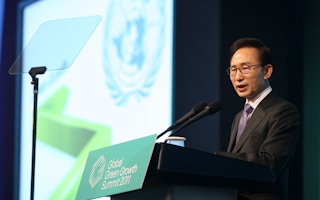New ideas, approaches and proposals were presented at a forum on green growth in Seoul on Thursday, as policymakers, scholars and businesspeople from around the world gathered to explore ways to further global action.
The Global Green Growth Summit, co-hosted by the Korean government and its think tank the Global Green Growth Institute, also served as an opportunity for Korea to present to a global audience its experience of the past four years since it set green growth as a new national vision.
“Despite the global economic crises and lingering uncertainties, Korea has made some significant changes and achievements on green growth,” President Lee Myung-bak said in his speech.
Lee started a national campaign in August 2008 to reduce Asia’s fourth-largest economy’s dependence on fossil fuels and develop renewable energies, green technologies and environmental industries into a new growth driver.
On the sidelines of the event, World Bank released its first report on green growth, urging governments around the world to think green when pursuing growth policies.
Titled “Inclusive Green Growth: The Pathway to Sustainable Development,” the report debunks the myth that a green growth approach is a luxury most countries cannot afford, pointing instead to political barriers, entrenched behaviors and a lack of appropriate financing instruments as the chief obstacles.
Seoul pledged $40 million to strengthen and expand the World Bank’s global green growth portfolio by tapping into and leveraging the country’s successful experience.
“Green growth is now transcending borders and becoming a true global asset,” Lee said.
Achim Steiner, executive director of the United Nations Environment Program, said, “Korea has succeeded through various policies, bringing green growth to a whole new level.”
He cited the four rivers project and the recently passed law to introduce a carbon emissions trading scheme by 2015.
“Korea is leading by example, not just through words,” he said.
Yang Soo-gil, chairman of the Presidential Committee on Green Growth, also said the country’s efforts to create a green economy are “beginning to take root.”
The country’s green R&D and businesses are thriving, he said, partly helped by the “green budget” for which the government allocated 2 percent of the nation’s gross domestic product to for the past four years.
Some international speakers offered advice.
Jeremy Lifkin, a renowned scholar whose vision for the “Third Industrial Revolution” was adopted by the European Union, said Korea needs to focus on the whole infrastructure, rather than isolated projects, to really realize a revolutionary change in the industrial paradigm.
“Do not make the same mistake as the United States,” he said, citing US President Barrack Obama’s push for costly, yet isolated, green projects.
He said a new industrial revolution will arrive from the convergence of renewable energy and the Internet. In his vision, people will produce energy from sun, wind, tidal geothermal, tidal power and more with the building they live in. And through an “energy internet network,” or a super grid, they will share surplus energy with others just like they share information on the internet.
“Korea can play a major role here. Korea is ahead of the game,” Lifkin said.
The country has some very good assets, he said, abundant renewable energy such as wind, tidal and solar potential; world-class technology that can enable the convergence of energy and communication; and its position as a peninsula to bridge the Asian continent with the Pacific nations.
Masayashi Son, CEO of Softbank in Japan, urged Korea and other countries to embrace a nuclear-free world.
“Korea and Japan are in similar situations: small land, huge power demand and heavy dependence on fossil fuels,” he said.
Japan, however, is taking a different path from Korea, stopping all of its 54 nuclear plants earlier this month, he pointed out.
“For Japan, renewable energy is not just an option. It is a must. Korea should have a solution for a nuclear-free future,” he said.
Son, who founded Japan Renewable Energy Foundation, proposed “the Asia Super Grid” as an alternative to nuclear energy.
“Mongolia has the potential renewable energy to provide enough electricity to satisfy two-thirds of the world’s energy demand through wind and solar. And the cost of wind energy there is just 3 cents per kilowatt-hour,” he said.
By building the Asia Super Grid, countries with lower costs can export surplus energy to others with higher costs of developing renewable energy, he said.

















